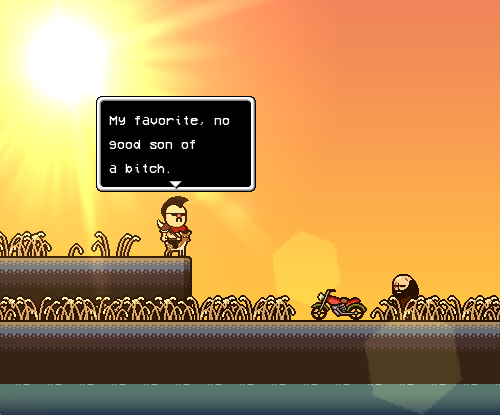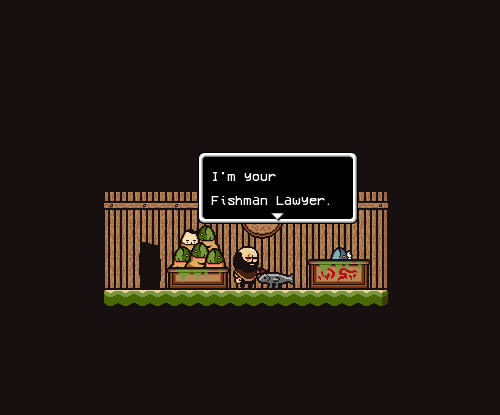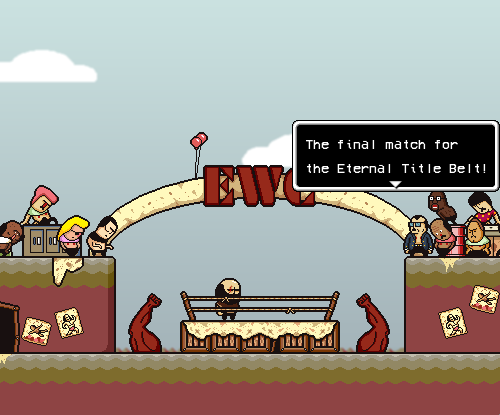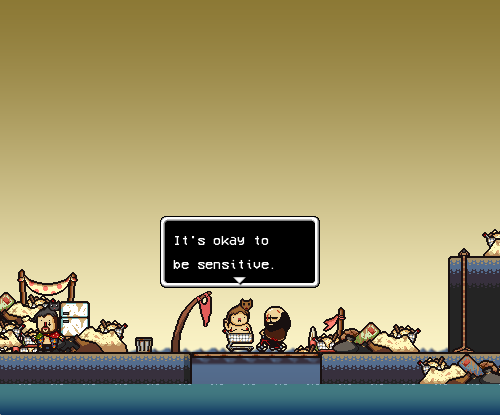Pop culture has an obsession with being “edgy,” whether it be through grittiness, hyperviolence, or manipulative melodrama. “Edgy,” as a term for describing somehow-exciting and somehow-different new art, has seemingly been drained of any positive connotations. It has become a word that’s to be used exclusively with a sarcastic tone, mocking the tryhards that would use it unironically to describe their supposedly daring and incisive new thing.
So what is LISA? A game with the unofficial subtitle of “The Painful RPG,” that touts a post-apocalyptic setting defined by amorality and violence, that features amputation and drug addiction as game mechanics—it’s edgy, certainly. But LISA is an effective reminder that “edgy” doesn’t always have to be said with an eyeroll and a scoff. Developer Dingaling has put in the effort to present a game that varies wildly in tone and charms, that does all it can to dodge the fatal one-note nature of so many other games that have tried and failed to claim edginess. LISA is a Venn diagram of “disturbing” and “silly” with a surprising amount of overlap, making its tangents purely into either side all the more effective.
In a Mad Max post-apocalypse of no women, Brad finds a baby girl abandoned in the desert. He takes it upon himself to raise her, giving her the best life he can by keeping her existence secret from a dangerously untrustworthy outside world. Over the years, the roving gangs inevitably learn of her, and decide to attack Brad’s home in an attempt to abduct her. She escapes, always staying one step ahead of the gangs, but it is up to Brad to save his adopted daughter and protect her from a sexually starved world that now knows she exists.
In style, LISA is most obviously inspired by EarthBound and the other games in the Mother RPG series, embracing their defining elements of odd, light-hearted whimsy while doubling down on their violence and dark turns. The idiosyncratic weirdness of EarthBound is the result of twice removing American culture from what it actually is (small town American suburbia by way of pop culture, then interpreted by Japanese game designers). The famous boss battle in EarthBound against the abstract embodiment of evil, Giygas, has taken on a pop culture cachet beyond the game itself, and the cosmically disconcerting quote, “You cannot grasp the true form of Giygas’ attack!” has a life of its own. LISA runs away with these influences and tries its honest best to replicate this feeling, with noteworthy results, through its own medley of bizarre images and retro sensibilities.
Maybe you’ll find your way to the island of garbage where they race grocery carts. Maybe you’ll find your way to the underwater city of fish people who try you in court for theft. Or maybe you’ll find the settlement that reveres a fast food drive-thru speaker box as a god. The world of LISA is filled to the brim with peculiarity, another unsettling (and quite often amusing) image waiting for you at the beginning of each new screen. You can encounter and recruit up to thirty party members, each one a distinctive cartoon. The entire roster carries with it just as much unique weirdness as all of the game’s locations.
Of particular note is the game’s soundtrack, which is easily the equal of the game’s imagery. Widdly 2 Diddly’s soundtrack is at times soothing and conventional, and at other times the most oblong and abrasive thing you could’ve ever imagined as video game music. The screeching battle themes and the unnerving score afforded the game’s darker moments make my hair stand on end, but the soundtrack is most memorable at its happiest. The song “Summer Love,” a chillwave instrumental with delightfully artificial horn and drum fills, might as well be LISA’s de facto theme considering how often it turns up and how utterly pleasant it is each time it does.
Gameplay-wise, LISA is a side-scrolling RPG with exploration and turn-based combat aplenty. These systems are neither flawed nor impressive, but the relatively vanilla presentation of its gameplay is how LISA makes it easy to enjoy the curiosities of its world, and especially of its characters. Sure, you’ve got the usual bruisers and their arsenal of standard weaponry, but then you’ve got the unexpected, like the blabbermouth whose spells consist of yapping at people, or the alcoholic who can take a mid-battle swig in preparation for a drunken tumble attack. Another character attacks by playing combos on his guitar, and yet another attacks by spectacularly failing a pro wrestling entrance—all accessible within your typical RPG combat menu.
Of course, a game with the subtitle, “The Painful RPG,” can’t all be light-hearted fun. There are a number of decisions that lead to permanent consequences—and we’re not talking about facile “good or bad” moral decisions here. As a recovering drug addict, Brad regularly feels withdrawal, a status effect that hobbles him. The only ways to get rid of it are to wait through a relative eternity of decreased damage output, or to take some “Joy,” giving you an insane high but making everything that much worse on the way down. Occasionally, you are forced to choose between all of your possessions (in a world that rarely gives handouts), the life of a party member, or a permanent stat decrease to Brad by way of an amputation. Sometimes, giving up your items isn’t even an option.
Brad is a strong player character and you are glad to have his strength. However, the deeper you play into LISA, the more you learn about his weaknesses as a person, and especially as a father, whose care might be coming too late for his daughter’s liking. When Brad is challenged to be selfless, will you choose to be selfish instead?
Still, while most of these events read as harsh but interesting game design, not all of them are so successful. LISA is difficult as-is, but some events seem outright unfair. Certain enemies have a random chance of permanently killing a party member. A mandatory Russian Roulette section early on is effective in creating white-knuckle tension, but it can also ruin your party to the point where its disturbing drama simply becomes frustrating.
At other times, the game’s vulgarity and presentation of extreme violence can be too much, to the point where it feels like the game might be reveling in its own depravity. For the most part, LISA is self-conscious about its status as a video game, and presents its more off-putting subject matter with a requisite amount of tact. However, a few images and story beats end up coming off as tasteless. I wouldn’t say any of it is malicious or grossly offensive, but LISA can be gratuitous—the closest it gets to being the fake sort of edgy that it otherwise sidesteps. Of course, this judgment ultimately depends on the individual sensibilities of each player.
That’s just how it is for the game as a whole. LISA isn’t for everyone. I found its mix of tones to be refreshing and laudably ambitious for a Kickstarter-backed indie game. However, it is easy to see how someone might dismiss it as that wrong sort of edgy if they aren’t looking for this sort of thing. But if you have been hoping for gaming experiences that try to be more out there than safe, LISA is an undeniably successful experiment in being a little bit weirder than everything else.






